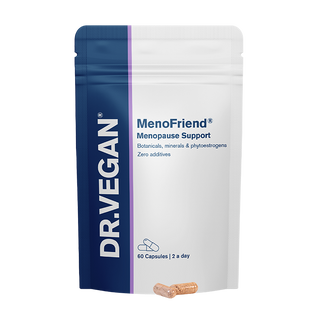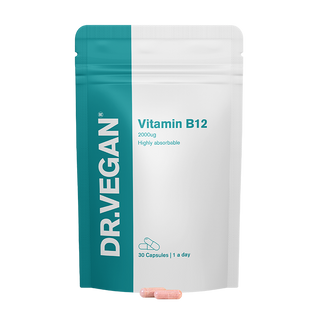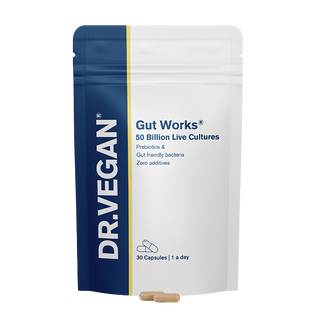Best supplements for women over 50

When we hit 50, our body's have different needs, the risk of deficiencies in some nutrients increases, and we need to adapt our diets and any supplement intakes.
Our nutritionists share the common vitamin deficiencies over 50, the best vitamins for women's health, how to support healthy hair and bone density, and the best foods for women over 50 and those to avoid.
What changes at 50?
50 is a significant age for most women. Typically, when we're 50, female sex hormones have dropped, and menopause is underway. At 50, our metabolism has also slowed down somewhat, and we are producing less COQ-10 (coenzyme Q10) naturally which can contribute towards physical and mental fatigue. Bones may also be losing density, leading to greater susceptibility to breaking and it is harder to maintain muscles mass and size at this age.
Not sure what your diet is missing? Create your Diet Profile for free nutritionist advice.
Common vitamin deficiencies over 50
Bone nutrients
Due to the drop in hormones, our bones start to lose density. This means our bodies need more nutrients to maintain the strength of our bones.
Calcium and Vitamin D are the most commonly discussed, however Magnesium, Vitamin K and Vitamin C are also essential nutrients to maintain bone health.
Vitamin D regulates calcium absorption through the gut, and Vitamin K takes the calcium into our bones. Magnesium also works in balance with calcium, so they're needed in the right balance. Vitamin C is needed for the collagen our bodies produce that keeps these minerals in place and helps to keep bones strong.
Learn more about Magnesium 'The Mineral Superhero' and 'Why is Vitamin D so important'.
Protein
Muscle mass may reduce for a few reasons, including being less active, sitting down more, combined with a natural process of muscle loss called 'sarcopenia'.
If you're on a mainly plant-based diet, there are some mistakes to avoid, however you can still get plenty of protein if you make the right choices. Over 50s need around 1.5g of protein per kg of body weight, which is double the 0.8g per kg of body weight needed by younger individuals.
Foods high in protein combined with an additional protein supplement may be needed to combat muscle loss, and it's important to stay active though to help prevent further loss. Learn more in the 'Best sources of protein on a plant-based diet'.
Vitamin B12
As we age, our ability to absorb Vitamin B12 decreases. Plant-based diets do not contain enough Vitamin B12, as it is largely only found in animal foods, so a Vitamin B12 supplement is needed.
A higher amount of Vitamin B12 in supplemental form is recommended for the over 50s, which is an essential vitamin for the brain, nerves and blood cell formation.
Learn more in '5 signs you may be low in Vitamin B12'.
Best vitamins for women's health
Women over 50 need a balanced diet that provides a good level of all nutrients. There are a few supplements that can go a long way in promoting health in women over this age.
Magnesium
Magnesium is needed for over 300 enzymatic processes within the body, including sensitising cells to hormones. These hormones include oestrogen, which is still produced after the menopause but in smaller quantities.
Making sure your cells are receptive to the lower level of insulin can make a difference to wellbeing, and studies show Magnesium may also increase cell sensitivity to insulin. When cell sensitivity to insulin is lost, diabetes can occur. Magnesium is also great for our bones and teeth which need greater support past the age of 50.
Discover more in 'How do I know if I'm deficient in Magnesium?'.
Vitamin D
Vitamin D deficiency is common in individuals over the age of 50. The UK department of health recommends Vitamin D supplementation for women and all adults in this age group. Not only is Vitamin D excellent for the health of our bones, it also helps regulate our immunity which can diminish as we age. Studies show Vitamin D may also play a role in balancing our moods and it is important for supporting our brain function.
Learn more in 'How do I know if I'm deficient in Vitamin D?'.
MenoFriend®

MenoFriend® | Natural menopause support
Vitamin B6
Vitamin B6 is excellent for regulating hormone levels, contributing to energy production and supporting blood cell development. Vitamin B6 works with Magnesium to produce the sleep hormone 'melatonin' and our feel-good hormone, 'serotonin'.
Hair thinning support
After menstruation has stopped in a woman, the level of female sex hormones decreases. As a result, testosterone levels become higher in relation to oestrogen and progesterone, and hair loss may result. But don't worry, there are a few nutrients that can support a head full of hair!
Protein
Having enough protein is essential for maintaining healthy hair. The hair structure is made up from amino acids found in the protein in your diet.
Vitamin C
Vitamin C is needed for healthy hair as it acts as an antioxidant which improves blood flow to the scalp.
Vitamin A
Vitamin A, which your body can make from beta carotene, is needed for the continuous regeneration of our body's cells. Hair cells grow at a rapid rate and require Vitamin A for their growth.
Vitamin B6
Vitamin B6 helps to balance testosterone levels in the body and can offset any damage that excess testosterone has on hair growth and loss.
Zinc
Zinc is an excellent mineral as it prevents testosterone from converting into its toxic form which can otherwise cause more damage to the hair follicles.
Women's health and bone density
Unfortunately, bone loss is often a fact of life for women as they get older. There are a few things that can help slow down loss however and keep your bones stronger for longer.
Get the right nutrients
As we mention earlier, including foods rich in Calcium, Magnesium, Vitamin D, Vitamin K and Vitamin C are all essential for bone health. As well as maintaining a healthy diet, a Daily Multi-Vitamin supplement containing these, or taking individual supplements, is ideal to provide further support.
Discover complete Bone & Muscle Support
Learn more about the best foods for all these nutrients in Vitamins & Minerals.
Exercise
Regular weight bearing exercise is important to maintaining bone density - your body actively slows down bone loss after frequent weight bearing exercise.
Remove sugar
Excess sugar in the diet causes a spike in blood sugar which ultimately leaches Calcium from the bones, then to be excreted in urine. This speeds up the rate of bone loss, so removing sugar from your diet helps maintain bone density.
Avoid stress
Stress is another factor that causes high blood sugar and loss of Calcium. Try meditation, yoga and walking among nature to relieve stress and anxiety. If that isn’t enough you may need to access your life and make further changes where necessary.
Best foods for women over 50
Fruits & vegetables
Fruits and vegetables are rich in potassium. Potassium is excellent for the cardiovascular system as it promotes normal blood pressure which decreases the risk of developing cardiovascular diseases.
Wholegrains
Wholegrains are rich in Magnesium which not only contributes to bone health but also to our heart health and muscle function. Magnesium is generally not consumed enough in many diets so ensure that you are choosing whole grain options of bread, rice and pasta, or take an additional magnesium supplement.
Green leafy vegetables
Green leafy vegetables are not only another excellent source of Magnesium, but also a source of Vitamin K needed for bone health and normal blood coagulation. You should aim for at least one portion of green leafy vegetables each day.
Protein
Protein super foods include quinoa, tofu, beans and lentils and are necessary for maintaining muscle mass. Additional plant-based protein shakes can be added into the diet if you struggle to get enough.
Avocados and pistachio nuts
Avocados and pistachio nuts are rich in Vitamin B6. Vitamin B6 is needed for normal testosterone levels in men and women, for immunity and for the synthesis of muscle mass. For women, our requirement for Vitamin B6 increases after the age of 50 as absorption of it in the gut starts to decrease.
Tofu, sesame and figs
Tofu, sesame and figs are rich in Calcium, necessary for bone health. Calcium intakes can be slightly lower on plant-based diets, so try to incorporate these foods as much as you can.
What to eat less of after 50
Salt
Salt, also known as sodium, can contribute towards high blood pressure and other heart diseases. It also decreases the hydration of the skin, and when too much salt is consumed, it can contribute towards decreased mental function. Be conscious of how much salt you are adding to food, and check packages to see the salt content of processed foods.
Saturated fat
While a little saturated fat is harmless, having moderate or high levels in your diet can contribute towards cardiovascular stress. Plant-based diets are typically lower in saturated fats but watch out for saturated fats in processed and ready-made foods.
Sugar and carbohydrates
Any excess sugar and carbohydrates will be stored as fat, particularly fat around the middle. As your metabolism shows down, you need less carbohydrates. Try to swap carbohydrate rich foods for protein rich foods which your body needs more of.
Iron
Your need for Iron reduces as menstruation stops. Menstruation and blood donation are the only outlets for iron, and too much can build-up in the body and cause a problem. Having said that, too much Iron generally isn’t a problem for those on a plant-based diet, as the body can easily control how much Iron is absorbed from plant foods. Just make sure you don’t take much more than the NRV for Iron (14mg) in your daily supplements.
Discover our range of vegan vitamins, supplements and probiotics.
Want to hear more from our nutritionists? Sign up to our email newsletter for insights and exclusive offers:





















